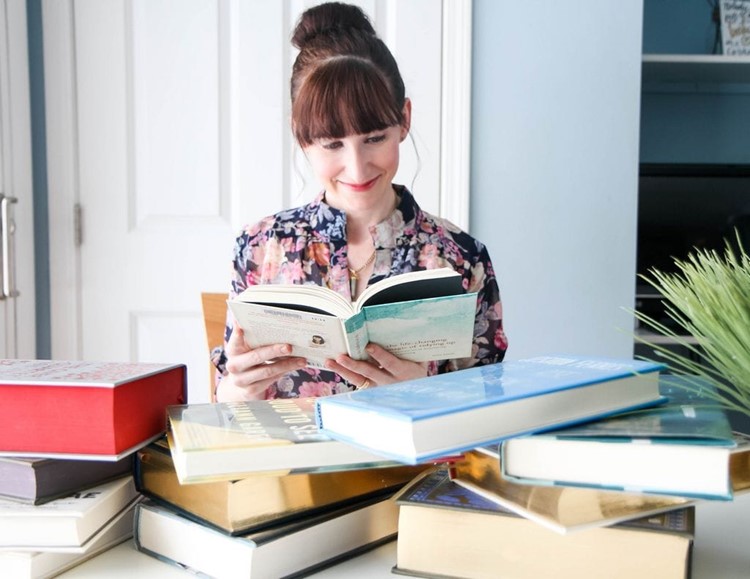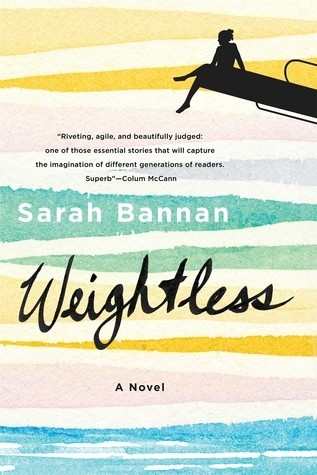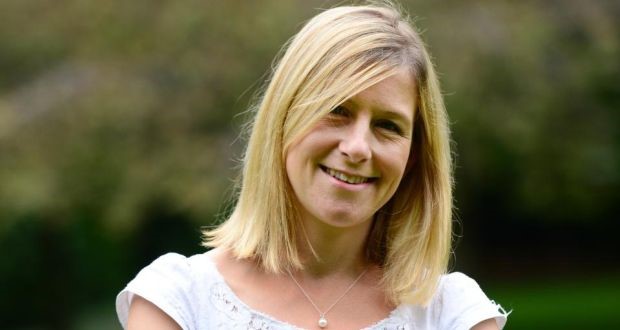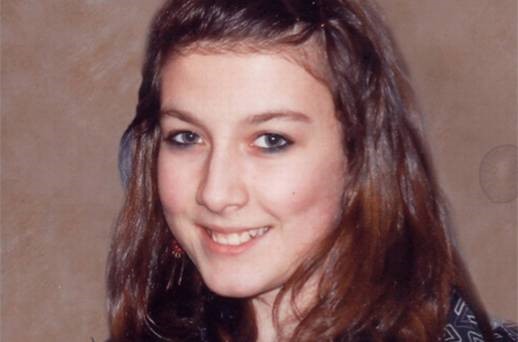
I have been so blessed to have such a great Sundays With Writers line-up this month. I hope you are enjoying this series half as much as I am! I have another incredible writer to feature today and I think her book should be mandatory reading for parents of teens and also a great book for older teens to read.
Today I am sharing a virtual cup of coffee with Sarah Bannan to talk about her debut novel Weightless. This book was an eye-opener for me about bullying today and how different it is from when we were kids… and, yet, in many ways how it is still the same. This is not a feel-good book today, but an unsettling look at how teens bully one another. I find her use of narrators (read more in our interview below) is what makes this book so compelling.

When Carolyn Lessing moves from New Jersey to Alabama with her mother, she rattles the status quo of the juniors at Adams High. Gorgeous, stylish, a great student and gifted athlete without a mean girl bone in her body Carolyn is gobbled up right away by the school’s cliques. She even begins dating a senior, Shane, whose on again/off again girlfriend Brooke becomes Carolyn’s bitter romantic rival. When a make-out video of Carolyn and Shane makes the rounds, Carolyn goes from golden girl to slut in an instant, with Brooke and her best friend responsible for the campaign.
Carolyn is hounded and focused on, and becomes more and more private. Questions about her family and her habits torture her. But a violent confrontation with Shane and Brooke in the student parking lot is the last attack Carolyn can take.
Bannan sheds light on how bullying happens now that kids have access to social media and creatively utilizes an undisclosed narrator who acts as an observer and participant in the bullying of a new girl at their school. Well-written and unflinching, it would be a great read for your older teen or for parents who want to see how bullying occurs today. I highly recommend this one!
Grab your cup of coffee and let’s settle in with Sarah Bannan to learn more about the story behind this story!

What prompted you, as a writer, to tackle the topic of bullying? Were there any real-life cases that were an inspiration to you when telling the fictional story of Carolyn?
When I was thirteen, my family moved to a small town in Alabama. I was in eighth grade at the time, and the move was something of a culture shock. My school was full of football and cheerleaders and cliques and the high school had an honest-to-god beauty pageant. We voted on class favorites and our cheerleaders and homecoming court. Everything seemed like a looks or personality contest, and that was a contest I knew I would never be in the running for, let alone win.
I had fantastic friends, and a great experience all through my time in Alabama, but I think I always knew that there was something in the town and the atmosphere of my high school that might lend itself to fiction. I’ve also found that my high school years and my friendships from that period still stick in my mind, all these years later. I’ve done a lot of reading about this – our obsession with our teenage years – and apparently it’s a time when you make some of your most lasting memories, in large part because this is the very time in which you are shaping and determining your sense of self, your individual identity. It’s also a time of firsts – first kiss, first drive, first break-up, first time away from home. And firsts are always a little easier to remember than second and third and fourth times. It’s one of the things about WEIGHTLESS that’s worth remembering, the degree to which it’s a document of memory: the narrators are looking back and trying to cobble together a shared truth of what happened over one school year. But they’re being really careful in the way that they do it, as they’re paranoid about accepting culpability or blame. Or defining themselves by what happened during the year.

When I started writing WEIGHTLESS, I had my high school in the back of my mind. But I was also reading a lot about bullying, and cyber-bullying, in the news. I was very much haunted by the story of Phoebe Prince, the young Irish girl who moved to South Hadley, MA when she was 15. She was bullied, and ultimately took her own life. I read a great deal about her story, and the complexities that surrounded it, and also about similar, less high profile cases back in Ireland, and I started to get a picture of what it looks like to be a teenager now, in the age of social media. This frightened me, to a significant degree, but it also made me feel that this was exactly the story I should be telling.
The narration in your story is told in first person plural. If that wasn’t unique enough, you don’t ever know the names of these narrators as they observe (and participate) in the bullying of Carolyn. Why did you choose this type of narration and why do you think this angle was the best way to capture the story?
I’ve said before that WEIGHTLESS began as a voice in my head that I just couldn’t shake. And that’s totally true. I had this chorus, in my head: a group of girls, sitting back, watching cheerleaders perform in front of them. They’re obsessed with the girls – with their childhoods, their appearances, their sex lives – and they seem to want to be them as much as they want to tear them down.
I tried, when I was first drafting the novel, to put it in first and third person voices – but it just didn’t work or, perhaps, I just didn’t have access to any voice else except this group of girls. They are watching from the outside, and passing comment on what they’ve seen, what they’ve heard, what they think they know.
It was only after I finished the novel that I realized what an effect the voice actually has and I think that’s why I felt I had to keep it, sustain it. Why I felt like it was the right way to go. The voice underlines the role of gossip in a town like this. Group-think. Rumor. Memory. Dissipation of responsibility. Avoidance of guilt.
Readers will notice when reading the book that it’s intercut with other forms of narration: Facebook feeds, newspaper articles, transcripts, committee reports. This was all in an effort to layer the narrative (the “we” can be awfully claustrophobic!) and highlight how the way in which what we hear often contrasts to what is reported. I wanted readers to feel as if they were picking up a kind of unofficial scrapbook for the year.
There are so many moments in this book that feel like you are inside the head of a teenager; in fact, I had a few flashbacks of my own moments when I was young. For example this line: “We sat outside Sbarro’s and ordered cheese pizza and we took off the cheese and blotted it with our napkins. We would eat frozen yogurt later, topped with Oreos and Reese’s Peanut Butter Cups and M&Ms.” I REALLY remember doing this as a teen and had completely forgot about it. How did you capture these teenage voices so perfectly?
It’s sad: it was eerily easy for me to access the actual teenage mentality, as I have not entirely matured, despite being 37 years of age! I don’t know. I mean, I just remember the boredom and contradictions of that time very clearly, and the same insecurities that plagued me then, still plague me today, but they are (thankfully!) not so pronounced or life-consuming.
In terms of some of the detail, one of my sisters is a high school English teacher in California and very kindly gave me advice around some technical things: brand names, technology in schools, cultural preoccupations. My other sister lives in Connecticut is the mother of two teenagers, and she was also able to give me insight into those matters – and her daughter kindly helped me with a number of important details, as did a cousin of mine. In some earlier drafts there are a few clangers – I think I may have even referenced a Nokia ring tone somewhere!
Raising compassionate kids is a really big thing for me as a mom. After all your research on cyberbullying, could you offer just one piece of advice for parents on how we can help our kids stand up to bullying?
Well, this is advice coming from a fiction writer…but I think we just need to encourage kids (and adults!) to be kinder to one another. When I went to school, I feel like there was a huge emphasis on self-confidence and achievement, and not much on character or empathy. I’m not saying we need to drop the first two, but we need more attention to the latter…and I think the best way to do this is to… read more literary fiction. I’m sure you’ve seen the countless studies about how reading literary fiction increases empathy and I know this to be true. It’s one of the few ways in which we can really get into somebody else’s shoes, imagine things from somebody else’s perspective. So…my advice is, surprise, to get kids to read more!
Were you ever bullied as a child or did you ever feel like you contributed in some way to the bullying of another? Was there one character in the story, in particular, you really related to?
I think there’s a distinction between bad behavior – or meanness – and bullying, and I was both the victim and the perpetrator of the former, but not the latter. I think this is the case, at least. I’m not sure that makes it better, but I think it’s worth making the distinction, and one of the things in WEIGHTLESS that emerges is the way in which we are sometimes a bit too quick to point fingers and apply labels of ‘bully’. And then ‘bullies’ end up being bullied and round and round and round it goes.
As I mentioned, I moved around a lot growing up, and every place we lived seem to contain these rituals and traditions that were almost designed to make kids, especially girls, compete against one another. And not in a healthy, esteem-boosting kind of way. In retrospect, it’s shocking to me that more shocking things didn’t happen, that there wasn’t more bullying. Kids, by and large, tried to be kind to one another, but only within our set little cliques. There wasn’t much mixing.
I love Carolyn the most, of course, of all the characters, but I was nothing like her in school: I was awkward and nerdy and of zero interest to guys. In many ways, in retrospect, I can see that this was a blessing. I wasn’t a threat to anyone at my school or in my town.
I suppose I identify with the narrators the most, and I’m sure this will make readers think I’m a horrible person, but I think young people, and adults, can be scarily lacking in empathy. And I was probably happy in the fact that I was rarely outwardly mean to anybody, but I also wasn’t in a position of power within my high school to do so. The narrators are neither as cool as they’d like to be, nor as lame as they think they are. They occupy this very important place in the middle of high school hierarchies, and I’m pretty sure it’s the place I occupied myself. I was never bullied, or not really, and I never bullied anyone, or not really. But I watched a lot of things happen. And I talked about it. And, in retrospect, I wish I had done more.
If you could tell anyone to read one book (other than your own) what would that book be?
I think that’s almost impossible for me as I read constantly, and I am forever discovering my newest favorite novel…So, I’m going to choose my novel of the moment, which is Sarah Crossan’s ONE, which will be published by Bloomsbury in August. It’s a verse novel for young adults, and it’s a beautiful story about conjoined twins. It’s completely consuming and unlike anything else I’ve ever read.
(I should also say that I reread, every summer, Meg Wolitzer’s THE INTERESTINGS and Curtis Sittenfeld’s PREP. Two completely amazing feats of literary fiction and coming of age…I know this is cheating but it’s hard for me!)
You can connect with Sarah Bannan on GoodReads, on Facebook, or through her website! I’m always thankful for these moments with writers and I hope you will pick up this amazing book! You can always connect with me on GoodReads,through our books section of our site, and you can read our entire Sundays With Writers series for more author profiles. Happy reading, friends!
*This post contains affiliate links!
Pin It